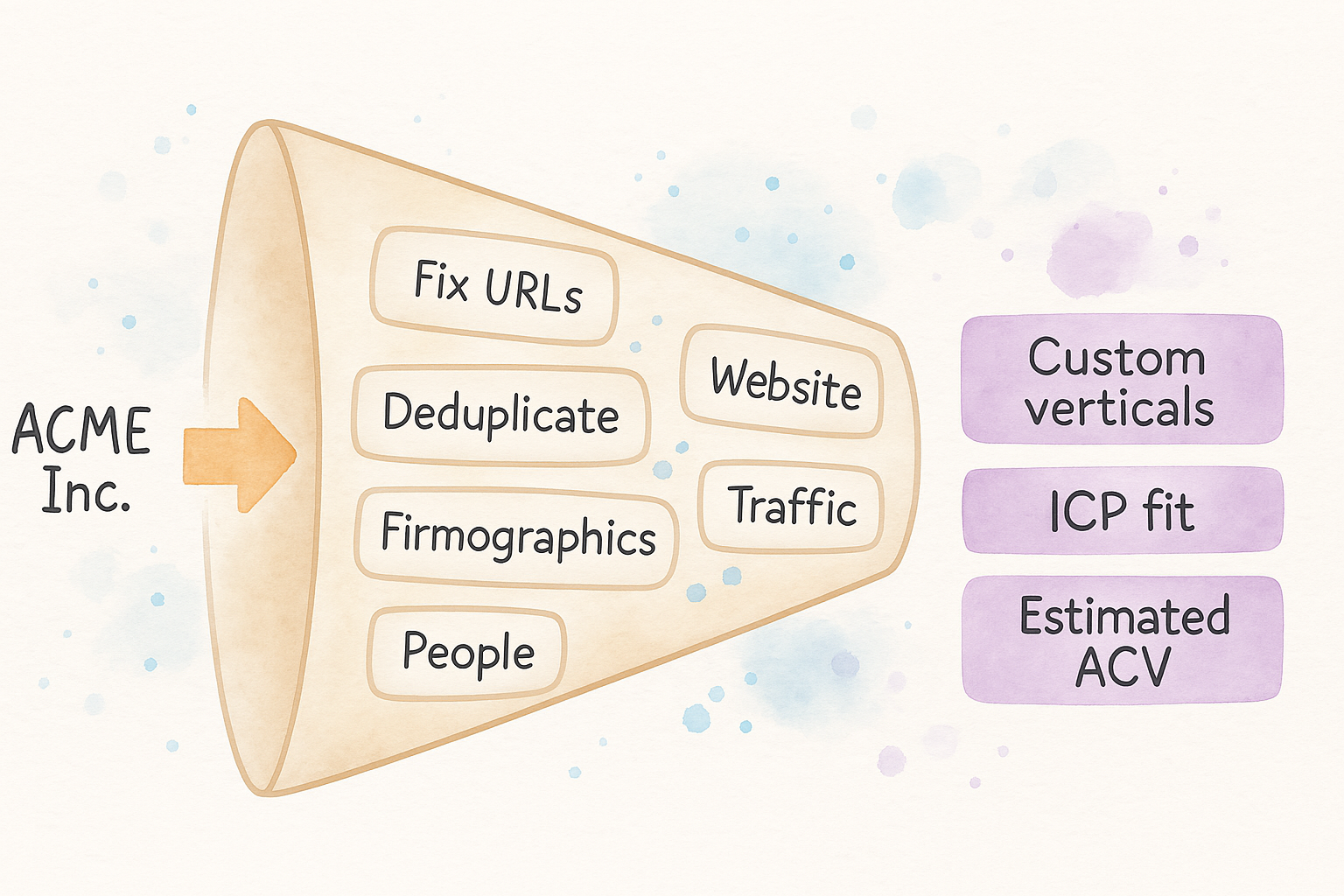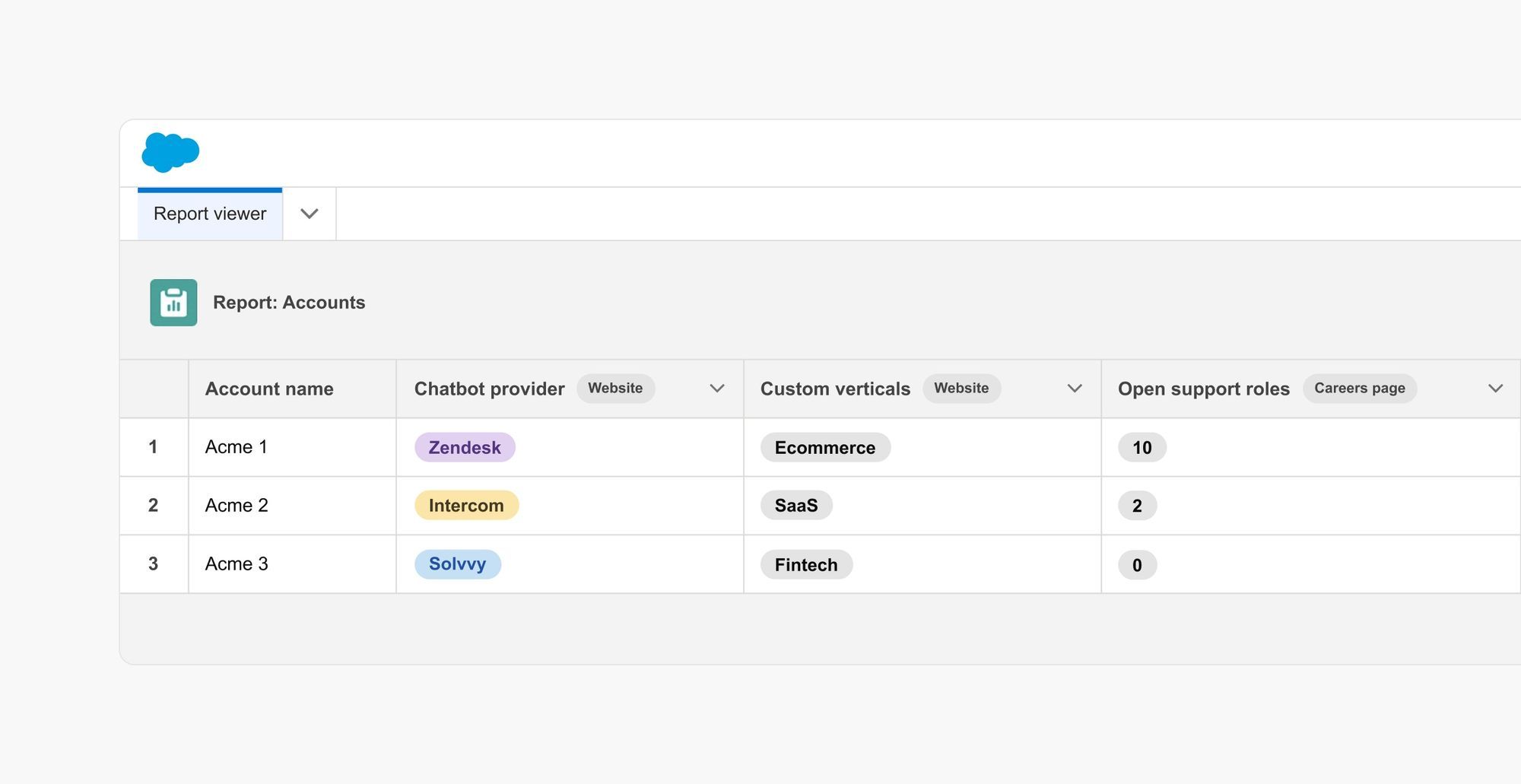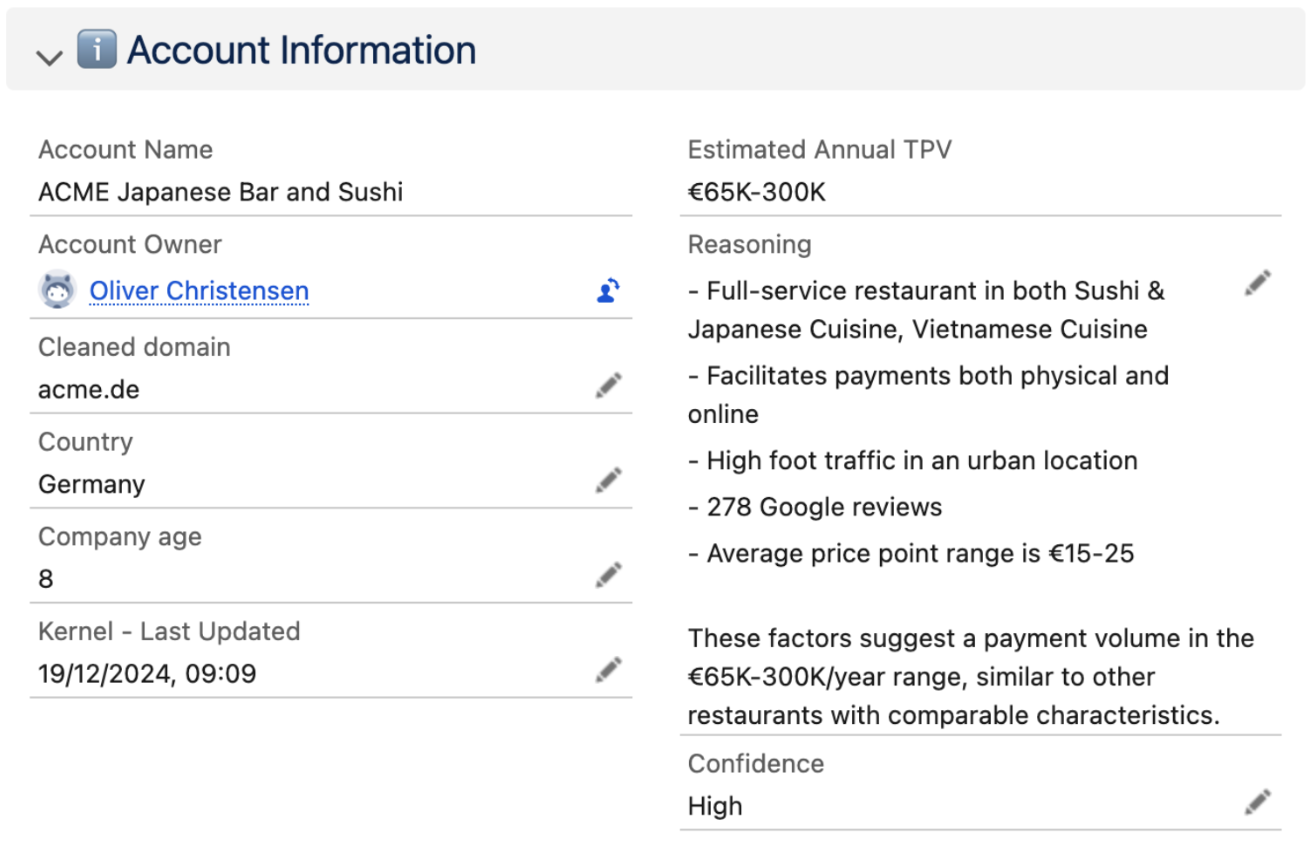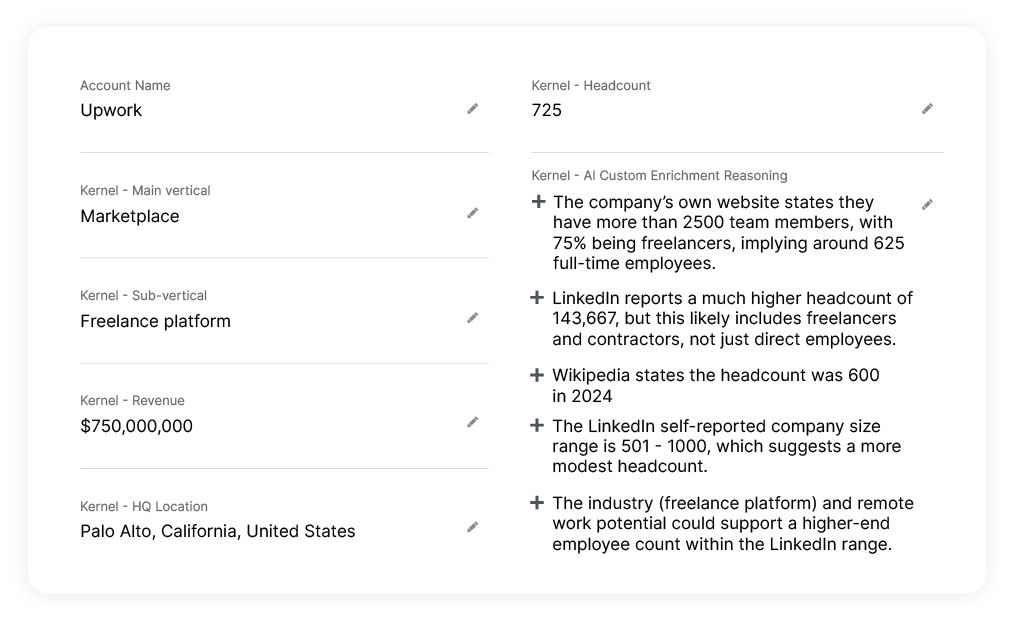Introduction to Data Enrichment
If your go-to-market (GTM) engine feels slow, scattered, or misaligned, don’t blame your reps. GTM performance issues are often misattributed to execution when in reality, the problem lies deeper in the quality of your account data.
Enterprise CRMs are often bloated with outdated, duplicated, or irrelevant account records. These silent data failures disrupt GTM alignment, waste SDR effort, skew segmentation, and erode forecast accuracy. What looks like poor execution is often just a symptom of broken or insufficient account enrichment.
In this guide, we explore how AI account data enrichment can turn a disconnected CRM into a trusted, up-to-date system that powers strategic Revenue Operations (RevOps) execution.
You’ll learn:
- Why pipeline problems often begin with broken or incomplete account data.
- How outdated enrichment creates friction across GTM functions.
- The difference between cosmetic enhancement and strategic enrichment.
- How live, AI-powered account intelligence drives targeting, forecasting, and expansion.
- What makes Kernel’s enrichment engine different from traditional enrichment tools.
- How companies like Zip, Remote, Ada, Array, and Flatpay transformed CRM performance with Kernel.

Why Pipeline Blockers Begin with Broken Data
Your CRM is only as effective as your underlying account data, which means limitations on efficiency are rooted at the source.
Pipeline slowdowns are often blamed on sales execution when in reality, they usually begin much earlier, at the account level.
Misdirected leads, ghost accounts, and conflicting ownership structures are signs that your CRM no longer mirrors your market. When data becomes unreliable, RevOps becomes reactive instead of proactive. As a result, instead of scaling strategy, your team then spends its time patching broken processes and cleaning up the CRM instead of pursuing the right leads.
That’s where Zip began. At the start of their CRM optimization journey, they pinpointed key opportunities to rejuvenate their data structure and segmentation. They set their sights on unifying fragmented records, refining corporate hierarchies, and realigning territories closely with their ICP. Their main aim was to reduce manual workarounds and support a GTM motion that was more scalable.
After implementing Kernel, Zip rebuilt its CRM from the ground up. Dead and duplicate records were eliminated. Hierarchies were restored. Enrichment was connected directly to Zip’s actual ICP, not a generic market view. Custom segmentation was added, helping distinguish fintech from edtech accounts and an internal scoring system was applied using product and sales engagement signals to create a clear prioritization model for every territory.
Zip’s Results:
- 20,000+ outdated or duplicate accounts removed.
- 100,000+ records reclassified with custom industry labels.
- Tiered account scoring implemented across regions.
- ICP-fit accounts added and activated for outbound.
The impact was immediate as segmentation became reliable while targeting was consistent. Pipeline velocity accelerated. By replacing fragmented enrichment with a unified system, Zip turned its CRM into a reliable foundation for every GTM team.
Disconnected or decaying CRM data creates friction across the entire revenue engine. Misalignment between sales, marketing, and customer success often stems from differing views of the same account. When routing fails, SDRs chase the wrong leads. Scoring becomes unreliable. Expansion strategies stall. Forecasting turns uncertain.
Our own internal analysis of enterprise CRM environments shows that over 30% of accounts contain inconsistencies large enough to distort pipeline modeling, rep allocation, or territory design. These issues don’t stay static. They compound, undermining performance and trust over time.
Remote’s RevOps team knew this firsthand. Their outbound reps were spending nearly a quarter of their time researching accounts instead of working them. The CRM lacked scoring, structure, and source intelligence. Reps had to manually fill the gaps to decide whether an account was even worth a call.
Kernel helped Remote regain control. Over 100,000 accounts were enriched and scored using a blend of firmographic, technographic, and custom intent signals. More than 15,000 high-fit accounts that were previously missing were identified and routed automatically. Reps gained back valuable time, and productivity rose because their territory planning finally aligned with revenue potential.
Remote’s Results:
- 15,000+ high-fit accounts sourced and enriched.
- $5M in new pipeline identified.
- 130+ additional SDR meetings booked each month.
- Structured territory mapping across 50+ regions.
With intelligence embedded directly in the CRM, reps no longer had to guess where to focus. They simply acted.

What Is the Difference Between Traditional Account Data Enrichment and AI Custom Account Data Enrichment?
Not all data enrichment delivers strategic value. Most data enrichment tools will only go as far as surface-level enhancements, often referred to as generic enrichment.
Generic account data enrichment applies static firmographic fields such as headcount, industry, or revenue, typically sourced from a limited dataset. There is no customization, and the impact is often short-lived. It fills the CRM but rarely supports long-term pipeline growth or alignment with your go-to-market strategy.
AI custom enrichment takes a fundamentally different approach. It is an ongoing, adaptive process that builds context-rich profiles of every account in real time, tailoring the data to your ICP. The data is sourced from public signals such as hiring trends, company websites, and market activity.
This level of enrichment reflects how your best sales reps research and prioritize accounts. It enables more accurate segmentation, faster targeting, and more confident execution across the entire go-to-market organization.

How Kernel’s AI Custom Enrichment Works
With Kernel, enrichment is no longer about data hygiene alone. It becomes a strategic function that ensures your CRM reflects how your market operates and evolves, supporting scalable, high-impact execution at every stage of growth.
This strategic value is delivered through Kernel’s AI custom enrichment module, which powers four core enrichment functions inside your CRM:
Enhanced Core Firmographics
Ensuring your CRM reflects real-world company structures, Kernel continuously verifies and updates core firmographic fields by:
- Maintaining accuracy across headcount, revenue, location, company age, and more.
- Verifying data using high-context sources such as company websites, financial filings, employment registries, and LinkedIn.
- Applying estimation models when public data is unavailable, using benchmarks, regional context, and growth indicators.
- Keeping records current as companies evolve over time.
Custom Account Enrichment
By uncovering deeper buying signals and operational context, non-standard data is captured, modeled, and structured into CRM-ready insights by
- Surfacing data points like cloud spend, AI maturity, and team composition.
- Sourcing information from hiring trends, product pages, regulatory filings, and public market activity.
- Modeling raw data into structured CRM fields for use in scoring, routing, and activation.
- Continuously refining enrichment logic based on frontline rep feedback.
Custom Verticals
To better reflect how your teams segment and sell, Kernel replaces generic industry tags with precise, product-aligned classifications by:
- Defining verticals and sub-verticals based on product offerings, business models, customer types, and market signals.
- Applying anti-vertical logic to exclude lookalike accounts that fall outside your ICP.
- Providing transparent reasoning behind each classification to support rep understanding and GTM execution.
Prioritization & Reasoning
To drive more confident targeting and territory design, accounts are tiered with full transparency into each decision by:
- Evaluating factors like company size, growth velocity, strategic fit, and engagement history.
- Explaining tiering decisions in plain language to highlight the key signals behind each score.
- Displaying enriched tiers directly within CRM views for visibility and auditability.
- Applying guardrails and incorporating rep feedback to ensure tiering remains accurate and actionable.
Together, these capabilities ensure enrichment becomes a continuous advantage inside your CRM. It is no longer a clean-up exercise but a foundational system that drives your entire go-to-market motion.
Array experienced the difference. As they expanded into new regions, their enrichment stack couldn’t keep up with shifting ICP definitions. Territory logic broke down. Manual workarounds increased.
Kernel introduced structured, context-rich enrichment. Existing accounts were reclassified and scored. Thousands of new targets were sourced and segmented automatically by region, vertical, and tier.
Array’s Results:
- 6,000+ new ICP-fit accounts sourced and activated.
Scheduling efficiency improved from 6% to 21%. - Vertical segmentation standardized across markets.
- Vendor costs reduced by consolidating enrichment tools.
With a scalable enrichment system in place, Array’s CRM became a competitive advantage rather than a maintenance burden.

Fix Your Data and Funnel with Live Account Intelligence
When faced with CRM decay, many enterprises take the obvious next step: plug in another third-party data tool. The problem is, most of these stop at cosmetic fixes. They append a few firmographic fields and call it enrichment. But adding static data does not make your CRM intelligent.
True account data enrichment is not about more fields. It’s about better context. That context must be aligned to your ideal customer profile (ICP), continuously updated, and embedded into your workflows.
When enrichment becomes live and strategic, it transforms your CRM into a source of real-time intelligence that supports confident segmentation, TAM planning, territory coverage, and forecasting.
Ada had seen this problem before. Their previous tools added new fields but didn’t solve the underlying problem of structure and reliability. As a result, RevOps spent far too much time manually triaging territories, resolving account conflicts, and interpreting ownership logic. Sales teams didn’t trust the data, and outbound efforts suffered from poor conversion.
With Kernel, Ada introduced always-on live account data enrichment. Instead of relying on occasional updates, the CRM was continuously cleaned, scored, and mapped based on real-time changes. Account routing became reliable. Corporate hierarchies made sense again. SDRs finally had context that sharpened their targeting.
Ada’s Results:
- Over 90% of pipeline sourced from Kernel-enriched accounts.
- Outbound conversion rates more than doubled.
- Manual triage efforts dramatically reduced.
RevOps returned focus to GTM planning.

Why Kernel’s AI Account Data Enrichment Stands Out
Most enrichment tools offer a simple data sync, layering on static firmographics and calling it enrichment. Kernel goes much further.
It transforms your CRM into a continuously evolving, strategic asset that stays aligned with how your market actually moves. The enrichment engine operates quietly in the background to strengthen your workflow by cleaning and updating your records in real time with high-quality data that your teams can trust.
Kernel integrates directly with Salesforce, fits your existing CRM structure, and requires no retraining. Every update is auditable and reversible. Implementation is fast and the on-hand support is human. Your team stays focused on strategy rather than system upkeep. Kernel is also SOC 2 Type II compliant and does not process personally identifiable information.
Here’s how it works:
AI Cleaning and Corporate Hierarchies
Kernel addresses the structural problems in your CRM, turning cluttered records into a usable foundation for execution.
- Safely merges duplicate records.
- Removes outdated and irrelevant accounts.
- Repairs master data inconsistencies.
- Builds complete corporate hierarchies based on your GTM definitions.
- Identifies missing parents and children across complex account structures.
- Enables clean routing, ownership, and segmentation logic.
Result: A reliable CRM that mirrors your market and supports scalable operations.
AI Custom Enrichment
Enrichment is only valuable when it reflects your actual ICP and sales motion. Kernel adds real context to your data.
- Accurate headcount and firmographics from verified sources.
- True corporate headquarters and clean location data.
- Revenue estimates for SMBs and hard-to-classify businesses.
- Custom attributes aligned to your ICP and product strategy.
- Refined vertical classifications beyond broad industry codes.
Result: Smarter segmentation, clearer prioritization, and better alignment across GTM teams.
AI Account Sourcing
Kernel finds high-fit accounts you’re missing and brings them into your CRM with accuracy and context.
- Identifies ICP-fit accounts missing from your CRM.
- Maps your total addressable market with custom filters.
- Deduplicates before adding to ensure data quality.
- Automatically routes new accounts to the right owners.
Result: Complete market visibility and high-quality pipeline inputs for sales and marketing.
With Kernel, enrichment is not a point-in-time fix. It is a live system that continuously aligns your CRM with your market, giving RevOps teams the trust, clarity, and control they need to execute at scale.

Why RevOps Requires Strategic Data Enrichment
When CRM data is untrustworthy, RevOps shifts from a strategic function to a reactive one. Time is lost and spent fixing records, resolving conflicts, and checking forecasts instead of building systems that scale.
Accurate, contextual, and continuously enriched account data changes everything. It enables more intelligent segmentation, clearer territory design, better campaigns, and more confident forecasting. When every team works from the same reliable source of truth, GTM alignment becomes possible.
Flatpay needed that clarity. Their CRM was bloated full of irrelevant accounts. Reps spent too much time chasing low-fit leads instead of closing high-value ones.
Kernel delivered enriched, contextual data, including merchant size and estimated payment volume. Low-potential accounts were filtered out automatically before they entered outbound workflows.
Flatpay’s Results:
- 22% of irrelevant accounts filtered out before outreach.
- 15% increase in SDR productivity.
- $1M+ revenue lift from improved account targeting.
- Significantly reduced time wasted on poor-fit leads.
Flatpay’s CRM became a streamlined engine for high-impact sales execution. The difference was tangible. Instead of chasing low-fit leads, Flatpay’s reps focused on high-value merchants, with targeting decisions made upstream. Kernel’s enrichment engine turned guesswork into precision and helped scale revenue with confidence.

What Happens When You Don’t Fix Your CRM Data.
When your CRM data is unreliable, trust breaks down across the revenue team. SDRs stop relying on their lead queues. Reps resort to building their own account lists in spreadsheets. Forecasts become shaky. RevOps shifts from strategic enablement to constant damage control.
The good news is that you don’t need to overhaul your entire system to fix it. The solution is far simpler: use AI-driven account data enrichment to keep your CRM accurate and up to date in real time.
By eliminating the guesswork, AI enrichment helps you maintain clean, consistent data — giving your team a solid foundation to focus on what really matters. You’ll be able to narrow down leads faster, target accounts more precisely, and unlock a deeper understanding of your core markets.

Transform RevOps Execution with Account Data Enrichment from Kernel.
Your CRM should be a strategic asset, not a liability. Kernel’s AI-powered account data enrichment transforms your CRM into a live, context-rich source of truth. One that enables segmentation, targeting, planning, and forecasting in real time, across every GTM function.
Don’t let stale data block your growth and derail your strategy. Schedule a discovery call with Kernel to see how AI-powered enrichment can turn your CRM into a platform for confident, scalable execution.


.png)


